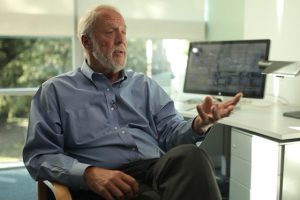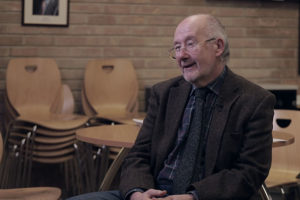Brain Language Research
Neuroscientist Friedemann Pulvermüller on brain-language relations, brain lesions, and simulation of cognitive...
What were the factors that led to the First World war? Why cannot the Second World war be seen as just the continuation of the First? How did the Second World War revolutionize the essence of war? These and other questions are answered by the Charles J. Stille Professor of History at Yale University Jay Winter.
I want to talk about the «Thirty Years War». That is a phrase that is usually used to describe many conflicts in the 17th century, but it has become adapted to describe what brings together the war of 1914 – 1918, on the one side, and the war of 1939 – 1945, on the other.
Many historians argue that the Second World War was simply the continuation of the First. My view is not quite that straightforward. In 1914-18 there occurred a conflict that had many different meanings, but one of them was a quarrel between Britain and Germany for control – economic and political – of northwestern Europe. Germany was the strongest economic power on the continent; Britain was the strongest global power and imperial power in the world. The collision between the two was for control over northwestern Europe. If Germany had beaten France, it would have controlled the English Channel; if you control the English Channel you control all the trade routes that the British population needed to feed its population: ¾ of the food that Britons ate in 1914 was imported.
And what was worse, the Peace Treaty that was signed at the end of it not only left fundamental problems intact, but created new ones, and those new ones have haunted us ever since.
For instance, in 1918 only Germany, Germany and only Germany was blamed as the responsible for the outbreak of the First World War; that is what the Peace Treaty says, article 231, and Germany had to pay for the crimes and damage that had been a result of their responsibility for the war. The German negotiators did not negotiate at all – they were there simply to sign a finished Peace Treaty. They were told ‘Take it or leave it’. The people who signed it were not the people who ran the war; they were the people who were starting to construct what we now call the Weimar Republic, a new democratic Germany.
Germany itself at the end of the First World War was not transformed into a viable democracy, but was created as a democracy totally hampered by the Peace Treaty. The other thing that took place that was really extraordinary was the perpetuation of imperial claims well outside of Europe. In China, for instance, the German possessions, which were quasi-imperial before 1914, had to be handed over as a part of the penalty of losing a war to one of the Allies. Well, the province of Shandong in the south of Beijing, its capital, Jinan, where Confucius was born, is right in the middle of China. China was an ally, a weak one in the middle of a civil war. But what happens, Japan was even bigger an ally, and had better naval power that had been very important in patrolling the Pacific Ocean entirely, including the northwest coast of Canada and the United States. So, the Allies gave Shandong province not to China, where it was, but to Japan, which was an imperial power holding Korea since 1911 and with interests all over northwest of China.
This was catastrophic. The head of the delegation in Paris who heard this bad news telegraphed back to Beijing and asked for instructions what is to do now, and they had nothing for three days. The reason is – they only found out three days later that the Chinese students who got the bad message that Japan would control Shandong province in the future burnt out the telegraph office – a good deal of imperial, European, Beijing – and came together to form a movement called the 4th of May movement; the 4th of May movement is an embryonic form of the Chinese Communist Party.
The Allies and, in particular, the American president Woodrow Wilson is the godfather of Chinese communism, and the recognition of Japanese imperial interests helped set in motion the conflict that led to 1941 – 1945 Chinese-Japanese War and to the Second World War itself.
The third part of this story is not about the terrible things that happened in the war or the terrible things that happened at the Peace Treaty. It is about the extent to which the Second World War is just the continuation of the First, and here I want to put two arguments: one on the one side and one on the other.
Yes, the Second World War that started in 1939 is the continuation of the First World War, because Hitler rewrote the outcome in May 1940 when he defeated France, Belgium, the Netherlands, and Luxemburg, he rewrote the outcome of military conflict of 1918 so Germany won. France was defeated – this is what should have happened in 1914; that is the continuity. On the one hand, I say ‘Yes, there is the 30 Years’ War’, but, on the other hand, what happened next is not the continuity. The invasion of the Soviet Union transformed the institutions of war.
Before and including the First World War war was there for political reasons – to force the other side to accept your political conditions, to make it inevitable that one side rewrote the current boundaries of the world and the other side had to live with it, one way or another. That is a political quarrel. But with the invasion of the Soviet Union in June 1941 war changed from being about politics to being about extermination.
Yes, there had been a genocide in the First World War perpetrated on their own people by the triumvirate that ran the Ottoman war effort, but it was not only the Jewish population occupied by German troops after Barbarossa – the invasion of the Soviet Union, but everyone. Their brutality and the sheer bloodbath that followed was a biological war to the death, and Hitler understood it that way.
What’s left out of this history? In all three of the discussions I have just opened what’s left out is the continuities in Russian history. Unfortunately, because of the nature of the communist regime, the First World War has been obliterated, effaced, eliminated from the history of the country: Year zero is the Bolshevik Revolution, and the decision of the Bolsheviks to take Russia out of the First World War. But the 20th century makes no sense whatsoever, and Russian history of the 20th century makes no sense unless Russian history is brought back into the European conflict of 1914-1918. The terrible consequences for Russia of the First World War were not only the Bolshevik Revolution, because it would never have happened without the First World War, but the construction of an authoritarian government with absolute power using military and police forces that were engaged in a kind of military operation against its own population. The Ukrainian famine would have never been possible without the manipulation and mobilization of millions of people and mass death that took place between 1914-1918.
My hope is that in the future Russian students –pupils from school up – will realize that when they celebrate the Victory on the 9th of May 1945, they are celebrating 30 years of conflict which Russia shared with the rest of the world.

Neuroscientist Friedemann Pulvermüller on brain-language relations, brain lesions, and simulation of cognitive...

Behavioral geneticist Robert Plomin on twin studies, genetic influence of parents on their children, and 1% of...

Psychiatrist Guy Goodwin on how LSD was discovered, why it became illegal and how psilocybin can help treat de...